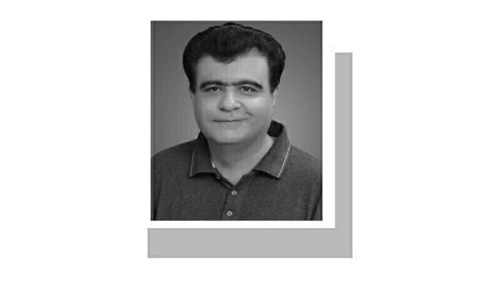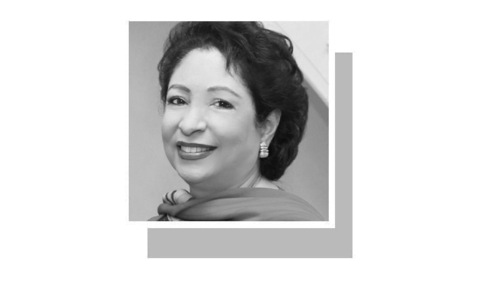THE 1956 constitution survived for two and a half years up until Ayub Khan’s martial law in October 1958. The 1962 constitution was the work of a military dictator, the preamble of which read, “I, Field Marshal Muhammad Ayub Khan … do hereby enact this Constitution”. The field marshal centred executive power in the office of the president, and in its original form, the 1962 constitution made fundamental rights non-justiciable.
The 1973 Constitution was adopted by the elected representatives of the people, and the preamble states, “we, the people of Pakistan … do hereby, through our representatives in the National Assembly, adopt, enact and give to ourselves, this Constitution”. The 1973 Constitution represents the will of the people. It has endured attacks by military dictators, and celebrated 50 years this year. But even at 50, our democracy and the fundamental freedoms at the core of the 1973 Constitution are not secure.
The nation is stuck in a repetitive cycle — continuously striving for timely, free and fair elections, protection of fundamental rights, and the empowerment of our civilian institutions.
First, at the heart of the Constitution is the right to be governed by one’s elected representatives. All power and authority is to be exercised through the chosen representatives of the people. In Punjab and KP, caretaker governments have been ruling the provinces for 11 months. While a constitutional command was violated, doctrine of necessity-laced excuses were adopted: lack of funds, the security situation, simultaneous provincial and national elections, etc.
The nation is stuck in a repetitive cycle: striving for fair and timely polls, basic rights, and civilian empowerment.
Against all odds, the Supreme Court ordered provincial polls on May 14. A decision of the highest court of the land was then brazenly defied. Many warned that if provincial polls are not being held on time, there is no guarantee that elections will be held simultaneously at the end of the year. Sure enough, it is now certain that there will be no elections this year.
The date for elections is Feb 8, 2024, and it is well beyond the 90-day limit at both the provincial and national level. While it was widely appreciated, the Feb 8 date has no constitutional basis at all; it is at best ‘necessity’ by another name.
Second, fundamental rights guaranteed under the Constitution continue to be violated without any accountability. Article 9 states that “no person shall be deprived of life or liberty save in accordance with law”. Article 10(2) states that “every person who is arrested and detained in custody shall be produced” before a court. Yet individuals are ‘disappeared’ and kept in unknown detention facilities. The disappeared individual is placed outside the protection of the law.
In a recent note in the elections case, Justice Athar Minallah stated that, “the phenomenon of enforced disappearances, one of the gravest and most atrocious forms of deprivation of constitutional rights, seems to have become an unannounced policy of the state since it was acknowledged with pride by a legitimised ruler in his memoirs”, the ‘ruler’ being Musharraf who in his book, In the Line of Fire, admitted to detaining individuals suspected of terrorist activities.
Enforced disappearances have disproportionately impacted those in Balochistan, and parts of KP. More recently, politicians have ‘disappeared’ for weeks and months on end, only to reappear after they renounce certain political affiliations. The complete impunity creates an atmosphere of fear, and suppresses dissent.
Former chief justice of Pakistan Jawwad S. Khawaja in his book, Slaughtered Without a Knife, states that during the hearings on a missing persons case, “two young teenage boys in school uniforms would come to the court”.
The father of the young boys was one of the victims of enforced disappearances. The former chief justice goes on to write that when the court questioned the federal secretary of the defence ministry about the lack of progress on the missing persons’ cases, the response was that they were not receiving cooperation from the “concerned quarters”. The lives of entire families have been destroyed, and children who should be in school have, instead, been forced into courtrooms to seek justice.
Overall, executive authorities have been treating court orders like mere pieces of paper. Bail in one case means registration of another case. Countless court hearings go by with no development in missing persons’ cases.
Additionally, the Constitution expressly mandates a separation between the judiciary and the executive. Judicial power can only be exercised by the courts. To allow serving army officers to conduct the trial of civilians amounts to creating a parallel judicial system.
Our elected representatives continue to display a lack of faith in our civilian institutions. The previous National Assembly passed a resolution endorsing the trial of civilians by military courts.
Subsequently, in a historic decision, the Supreme Court held that the section in the Pakistan Army Act, 1952, which permitted trial of civilians by military courts, was unconstitutional. A decision which should have been welcomed has been appealed by the federation as well as three provinces. Military courts for civilians was a system born under the Ayub regime — it should have been consigned to the history books long ago.
There is an insistence on ‘justice’ by the military. The same old rationale is given: the criminal justice system is broken, and, therefore, there is no choice but to hand over civilians to the military. Until we empower and trust our civilian institutions, they will never flourish. No one would argue with the need to reform, and improve the criminal justice system. But can the answer ever lie in militarising justice?
Fifty years after 1973, the people’s fight for compliance with the basic, fundamental commands of the Constitution continues.
The writer is a barrister.
X: @RidaHosain
Published in Dawn, December 9th, 2023















































Dear visitor, the comments section is undergoing an overhaul and will return soon.